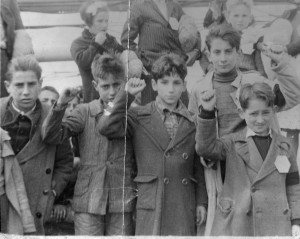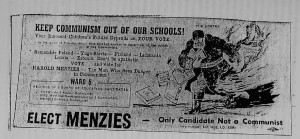Watt Prizes Awarded
Two undergraduates and one graduate student have won the George Watt Memorial Essay Award with outstanding projects on the Cold War, the Franco Regime, and refugee aid.

Children preparing for evacuation from Spain, during the Spanish Civil War, some giving the Republican salute. Photographer unknown. Tthe estate of Olga Brocca Smith. CC BY-SA 3.0
The 2016 jury awarded three students the George Watt Prize for the best essay on the Spanish Civil War. Once again, students from across the globe submitted high-caliber writing at the undergraduate and graduate level. While the award is usually given to one undergraduate and one graduate student, this year the competition was so strong at the undergraduate level that the jury decided to award two prizes. Each student receives a cash award of $250 from ALBA’s George Watt Fund.
A new Pre-Collegiate category has been added to the Watt Essay Award for future competitions.
Samuel Chan is one of the recipients of our undergraduate award for his insightful essay “No Child ‘Left’ Behind: The Cold War Educational Prejudice Against the Left and its Impact on the Spanish Civil War.” Chan looks at how the Spanish Civil War was either ignored or was used as a tool to attack Communism and create an anti-Left narrative in the United States primary schools of the 1960s. With a critical eye, he draws deeply on oral research with a history teacher from the era to help reach his conclusions. Chan is from Hong Kong and wrote his essay while a student at De Anza College in California. He is now completing his degree at the University of California-Los Angeles and hopes then to go to graduate school to study European history.
Paul Oshinski, a political science and international affairs major at the University of Georgia, also received the Watt undergraduate award for his essay “The Spanish Civil War: Analysis of the Nature of the Franco Regime and Theoretical Explanations for the Causes of the War.” This paper explores the role of collective action and the impact of a diffuse military on the Spanish Civil War. He also uses political theory to analyze how the Franco regime is better understood as an authoritarian state based on personal rule rather than a strictly fascist state. Oshinski wrote his paper as part of Emory University’s European Politics Program in Madrid that focused on the lasting effects of the Civil War and the Franco regime on Spanish politics. He plans to pursue a Masters degree in international policy after completing his undergraduate degree.
Kerrie Holloway, who is completing her doctoral degree at Queen Mary University of London, received the graduate student award for “The Flight to France and Concentration Camps: The NJC and the Spanish Refugees,” a chapter in her forthcoming dissertation “Britain’s Political Humanitarians: The National Joint Committee for Spanish Relief and the Spanish Refugees of 1939.” Kerrie provides a riveting account of the nearly 500,000 Spanish refugees who withdrew from Spain at the end of the Civil War in 1939 and the British humanitarian volunteer organization the National Joint Committee for Spanish Relief which helped care for them on their journey. She shows how volunteers saw themselves as helping to continue the fight against fascism in internment camps in France. This is an important study of refugees of the Spanish Civil War and political humanitarianism that takes both a top-down and bottom-up approach and is based on wonderful research in archives in the United Kingdom, Spain, and the United States.
The jury for the 2016 Watt award was comprised of three scholars: Josh Goode (Claremont Graduate University), Gina Herrmann (University of Oregon), and Aaron Retish (Wayne State University).
We are also happy to announce that a new Pre-Collegiate category has been added to the Watt Essay Award for future competitions. Alumni of ALBA’s teaching institutes can submit assessed work from a student or group of students based on curriculum developed by the teacher’s experience at the ALBA institute. The committee hopes to recognize the continued dedication of ALBA alumni and the creative work of their students for this category.
The George Watt Memorial Essay award honors the memory of Abraham Lincoln Brigade veteran George Watt (1914-1994), a social worker, writer, and lifelong activist central to the creation of ALBA.
Samuel Chan, De Anza College. “No Child ‘Left’ Behind: The Cold War Educational Prejudice Against the Left and its impact on the Spanish Civil War” (undergraduate)
 To some, the Spanish Civil War was a struggle of a democratically elected government against power hungry Fascists. To people with leftist sympathies, it was a battle against counter-revolutionaries who opposed and despised the advancement of socialist ideas in Spain. To religious groups, the Civil War was merely a crusade against the godless forces secretly led by the Comintern. These conflicting interpretations could not be more apparent in the Cold War, a time of political polarization and the Red Scare in the United States. In my paper, I analyze the effects of the Cold War mentality on the recording and teaching of the Spanish Civil War in North America. How did the Cold War influence the teaching of the Spanish Civil War in the United States? I interviewed my history professor, Mr. John Hamer, and recorded an oral history of how he learned about the Spanish Civil War as a student and he taught it in the 1970s. Mr. Hamer’s testimony reveals certain anomalies in how historians treated the Spanish Civil War in the Cold War. Research confirms a Cold War discounting of the Spanish Civil War. In a western civilization history textbook from 1968, for example, only two sentences out of 1,040 pages are dedicated to the Spanish Civil War. (For a complete version of the paper in pdf, click here.)
To some, the Spanish Civil War was a struggle of a democratically elected government against power hungry Fascists. To people with leftist sympathies, it was a battle against counter-revolutionaries who opposed and despised the advancement of socialist ideas in Spain. To religious groups, the Civil War was merely a crusade against the godless forces secretly led by the Comintern. These conflicting interpretations could not be more apparent in the Cold War, a time of political polarization and the Red Scare in the United States. In my paper, I analyze the effects of the Cold War mentality on the recording and teaching of the Spanish Civil War in North America. How did the Cold War influence the teaching of the Spanish Civil War in the United States? I interviewed my history professor, Mr. John Hamer, and recorded an oral history of how he learned about the Spanish Civil War as a student and he taught it in the 1970s. Mr. Hamer’s testimony reveals certain anomalies in how historians treated the Spanish Civil War in the Cold War. Research confirms a Cold War discounting of the Spanish Civil War. In a western civilization history textbook from 1968, for example, only two sentences out of 1,040 pages are dedicated to the Spanish Civil War. (For a complete version of the paper in pdf, click here.)
Paul Oshinski, The University of Georgia “The Spanish Civil War: Analysis of the Nature of the Franco Regime and Theoretical Explanations for the Causes of the War” (undergraduate)
Broadly, this paper’s purpose is twofold: to classify the type of authoritarian regime Franco administered, as well as to understand the political processes that preceded Franco’s ascension to power. First, I examine what type of regime that Franco administrated during the Spanish Civil War. This section also looks for fascist tendencies in the Franco regime and whether it should be classified as a military, personalist, or party regime, as defined by Barbara Geddes. The second section examines the political dynamics and coordination games that lead to democratic backsliding and regime transitions. Collective action and coordination games play a role in the overthrow of regimes and these political processes help reveal the motives and goals of the regimes that clinch power. I use a case study from Spain during its interwar period to understand the coordination games and collective action problems that many citizen movements face during both an attempted coup and a civil war. (For a complete version of the paper in pdf, click here.)
Kerrie Holloway (Queen Mary University of London) “The Flight to France and Concentration Camps: The NJC and the Spanish Refugees” (graduate)
Just after the fall of Barcelona in January 1939, roughly 500,000 Spanish civilians and soldiers fled north to the French frontier in what became known as the retirada, or withdrawal, along with the relief workers who had been attempting to alleviate the sufferings brought about by Spanish Civil War. One of these groups, a British
voluntary organization called the National Joint Committee for Spanish Relief (NJC), espoused neutrality, never sent aid to the Nationalists and chose not to remain behind as Franco entered Barcelona. Instead, it continued its work: first, on the road as refugees trudged north, setting up roadside canteens and makeshift first-aid tents, and finally in the concentration camps into which the refugees were herded.
This essay looks at the journey from Barcelona to France, following the refugees and relief workers alike as they crossed the frontier, were placed into provisional sorting camps and entered the now infamous concentration camps of Argelès-sur-Mer, Saint-Cyprien and Barcarès. It focuses on the work provided by the NJC, through both a top-down approach, utilizing the organization’s published bulletins and meeting minutes, as well as a bottom-up approach, incorporating testimonies from relief workers and refugees, to provide a full picture of the humanitarian aid given by the NJC, as well as received by the refugees, during the retirada. This thesis chapter argues that the political sympathies of the NJC allowed them to give aid more effectively than organizations that remained strictly neutral, as its workers better understood the needs of the refugees – both ideologically, through the provision of cultural relief within the camps, as well as physically, through the donation of food and clothing. (For a complete version of the paper in pdf, click here.)












